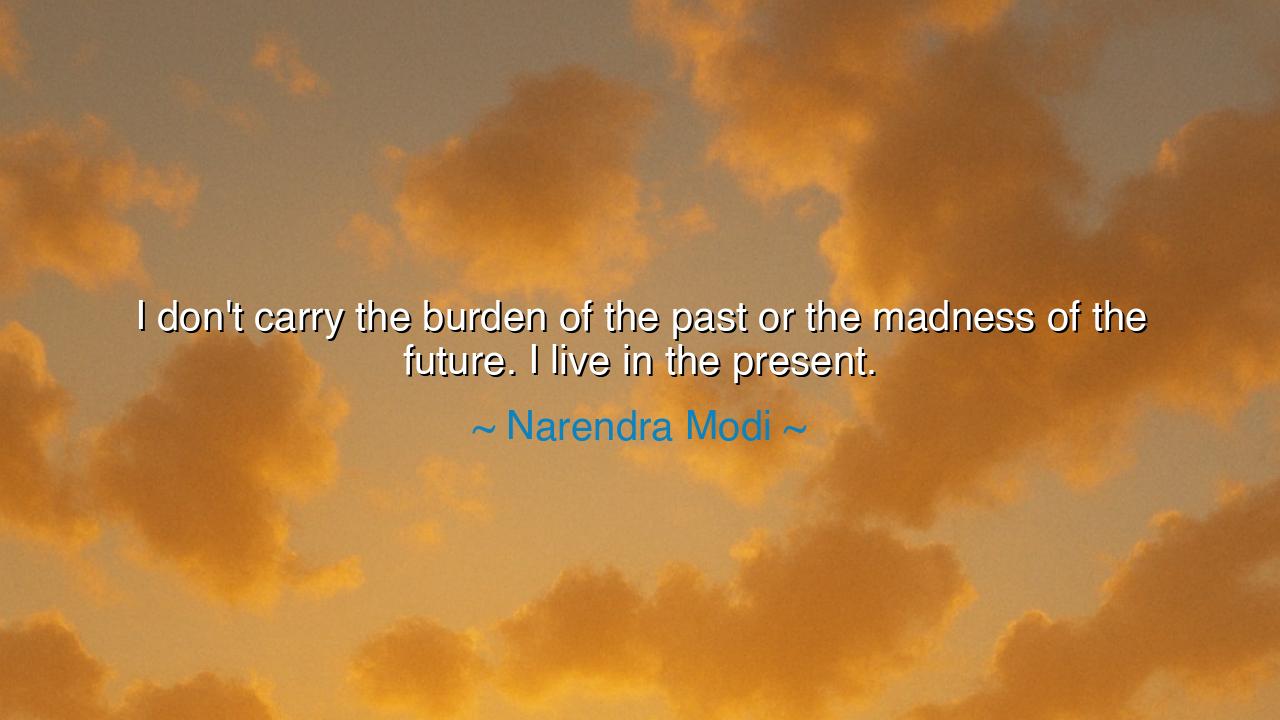
I don't carry the burden of the past or the madness of the
I don't carry the burden of the past or the madness of the future. I live in the present.






“I don't carry the burden of the past or the madness of the future. I live in the present.”
— Narendra Modi
In these words, Narendra Modi, the leader who rose from humble beginnings to guide one of the world’s great nations, gives voice to a truth as ancient as the mountains and as urgent as the heartbeat of this moment. His statement, though brief, carries the weight of centuries of wisdom. “I don’t carry the burden of the past or the madness of the future”—this is not merely political philosophy, but spiritual discipline. It is a call to dwell fully in the present, that fleeting space where life truly happens. For the past, heavy with regrets, can enslave the spirit; and the future, wild with uncertainty, can drive the mind to madness. To live in the present is to be free—to stand unshaken amid the storms of time.
The origin of this quote lies in Modi’s lifelong journey—a man shaped not by privilege, but by perseverance. As a young boy serving tea at railway stations, he learned early that time waits for no one. Every day offered a choice: to lament what was lost, to worry about what might come, or to act with purpose in the now. His words, spoken later in life, reflect not arrogance but clarity. Having faced both triumph and criticism, he understood that the power to shape destiny lies not in reliving what has been, nor in fearing what might be, but in mastering the moment at hand. In this way, his statement becomes both a personal truth and a universal law.
This philosophy is ancient, echoing the wisdom of sages and warriors who came long before. In the Bhagavad Gita, Lord Krishna instructs Arjuna amidst the chaos of battle: “You have a right to action, but never to the fruits of action.” It is the same teaching—release the past, release the future, and focus upon what stands before you. The warrior who hesitates, chained by memory or fear, loses his purpose. Likewise, the leader who carries the burden of the past becomes weary, and the one consumed by the madness of the future becomes blind. To live in the present is not to ignore time—it is to see it clearly, as a river that can only be crossed step by step, one moment at a time.
History is filled with examples of this wisdom made flesh. Consider Mahatma Gandhi, who, amidst the vast uncertainty of India’s struggle for independence, refused to be paralyzed by fear of failure or haunted by the failures of the past. He lived wholly in the present, spinning his wheel, walking his miles, speaking his truth each day as if it alone mattered. His strength did not come from prophecy or nostalgia—it came from presence. Likewise, Abraham Lincoln, during the American Civil War, faced unimaginable pressure. Yet he once said, “The best thing about the future is that it comes one day at a time.” Both Gandhi and Lincoln understood what Modi expresses in his modern voice: that leadership—and indeed life itself—requires living in the fullness of now.
To live this truth, one must practice letting go. The burden of the past whispers of guilt and glory alike—it binds the soul to what can no longer change. The madness of the future, on the other hand, whispers of fear and desire—it blinds the eyes to what already is. The present moment is often small, quiet, even unremarkable, but it is there—like a clear flame amid darkness—that life’s power burns brightest. To live in the present is to open one’s eyes to the miracle of existence itself, to act without hesitation, and to rest without regret. It is the way of the monk, the warrior, the artist, and the wise.
Yet this way is not without challenge. The modern world teaches the opposite—to carry the weight of memory, to drown in the noise of tomorrow. We are taught to chase, to compare, to anticipate endlessly. But as the ancients would say, “He who chases two horizons finds neither.” The practice of living in the present demands discipline: the courage to release what no longer serves, and the humility to trust that the moment before you contains all you truly need. Modi’s words, though shaped by politics, transcend politics—they are a call to inner mastery, to find peace not in circumstance, but in awareness.
So, my listener, let this teaching settle deep within you: the present is your kingdom. Do not live as a prisoner of what cannot return, nor as a slave to what does not yet exist. Be as the mountain that stands unmoved by passing winds; be as the river that flows only where it is. When you eat, eat. When you walk, walk. When you work, give your full heart to that work. Each moment you live fully is a victory over time itself. For in the stillness of the present, you will find not only freedom, but the quiet strength to meet the past with wisdom and the future with grace.
Thus, as Narendra Modi teaches, the art of life is not to chase what was or what may be—it is to inhabit the now. In this sacred moment, the past has no claws, the future no fangs. Here, in the eternal present, the soul is light, the mind is clear, and the heart is whole. And perhaps this is the greatest secret of all: that eternity itself is not beyond us—it is hidden in this very breath.






AAdministratorAdministrator
Welcome, honored guests. Please leave a comment, we will respond soon